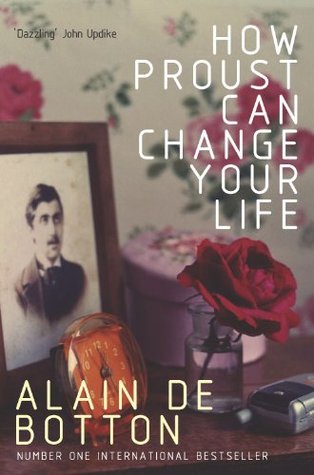More on this book
Community
Kindle Notes & Highlights
Read between
September 10 - September 15, 2024
Such intimate communion between our own life and the novels we read may be why Proust argued that: In reality, every reader is, while he is reading, the reader of his own self. The writer’s work is merely a kind of optical instrument which he offers to the reader to enable him to discern what, without this book, he would perhaps never have experienced in himself. And the recognition by the reader in his own self of what the book says is the proof of its veracity.
The value of a novel is not limited to its depiction of emotions and people akin to those in our own life, it stretches to an ability to describe these far better than we would have been able, to put a finger on perceptions that we recognize as our own, yet could not have formulated on our own.
‘That abominable and sensual act called reading the newspaper,’ wrote Proust, ‘thanks to which all the misfortunes and cataclysms in the universe over the last twenty-four hours, the battles which cost the lives of fifty thousand men, the murders, the strikes, the bankruptcies, the fires, the poisonings, the suicides, the divorces, the cruel emotions of statesmen and actors, are transformed for us, who don’t even care, into a morning treat, blending in wonderfully, in a particularly exciting and tonic way, with the recommended ingestion of a few sips of cafe au lait.’
Much literature and drama would conceivably have proved entirely unengaging, would have said nothing to us had we first encountered its subject matter over breakfast in the form of news-in-brief. Tragic end for Verona lovebirds: after mistakenly thinking his sweetheart dead, a young man took his life. Having discovered the fate of her lover, the woman killed herself in turn. A young mother threw herself under a train and died in Russia after domestic problems. A young mother took arsenic and died in a French provincial town after domestic problems.
And that friendship is in the end no more than ‘. . . a lie which seeks to make us believe that we are not irremediably alone.’
Proust, cloistered in bed in Paris, had difficulty appreciating why anyone would be dissatisfied with the idea of spending a holiday on a beach with some young people, whose only fault was not to have read Descartes: I do my intellectual work within myself, and once with other people, it’s more or less irrelevant to me that they’re intelligent, as long as they are kind, sincere, etc.
The happiness which may emerge from taking a second look is central to Proust’s therapeutic conception, it reveals the extent to which our dissatisfactions may be the result of failing to look properly at our lives rather than the result of anything inherently deficient about them. Appreciating the beauty of crusty loaves does not preclude our interest in a château, but failing to do so must call into question our overall capacity for appreciation.
Proust suggests that we have a better chance of generating vivid images of our past when we are involuntarily jogged into remembering it by a madeleine, a long-forgotten smell or an old glove, than when we voluntarily and intellectually attempt to evoke it: Voluntary memory, the memory of the intellect and the eyes, [gives] us only imprecise facsimiles of the past which no more resemble it than pictures by bad painters resemble the spring . . . So we don’t believe that life is beautiful because we don’t recall it, but if we get a whiff of a long-forgotten smell we are suddenly intoxicated, and
...more
but perhaps there are limits to how far one can ignore the lesson of perhaps the wisest person in Proust’s book, a certain Mme Leroi, who, when asked for her views on love, curtly replies: ‘Love? I make it often, but I never talk about it.’
It is one of the great and wonderful characteristics of good books (which allows us to see the role, at once essential yet limited, that reading may play in our spiritual lives) that for the author they may be called ‘Conclusions’ but for the reader ‘Incitements’. We feel very strongly that our own wisdom begins where that of the author leaves off, and we would like him to provide us with answers when all he is able to do is provide us with desires . . . That is the value of reading, and also its inadequacy. To make it into a discipline is to give too large a role to what is only an
...more
It should not be Illiers-Combray that we visit: a genuine homage to Proust would be to look at our world through his eyes, not look at his world through our eyes.


